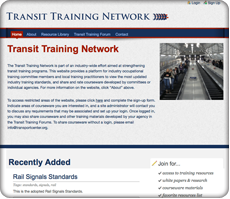Labor-Management Partnerships
Work together for better results
With experienced facilitators and experts in labor-management relations, the Transportation Learning Center can help build labor-management partnerships that:
- Improve workplace atmosphere
- Plan trainings that everyone will support
- Allow your workforce to pursue new initiatives as partners
- Provide a forum for agency-wide input
Federal support for transit revolves around big capital expenditures. When a new rail line opens, or a fleet of new buses arrive, that’s big news for the transit agency. Top level officials from the U.S. Department of Transportation to the local transit agency put a very high priority on making sure that these big equipment purchases include use of the most up-to-date and capable technology.
Ultimately though, people operate that technology. To become really modern, high-performance organizations, transit at all levels need to pay more attention to its workforce.
A good relationship between labor and management in the transit industry is the key to a positive and productive workforce. Typically, blue collar jobs comprise 80-85% of all transit agency jobs, and up to 95% of those employees are union members. Bargaining over wages can be tough. Disciplinary disputes get even tougher. Too often, the contentious relationship develops a dynamic of its own. Couple this fact with an economy that has lead to the shrinking of local and state government revenues, and in turn, the reduction of transit funding, and the road to a cooperative labor-management relationship becomes even rockier.
Fortunately, not all the interactions between labor and management have zero-sum outcomes. To cite just one example, both sides can benefit from an improved training program. Better health and safety also benefit everyone. The Center has over a decade of experience building labor-management partnerships in the transit industry.
